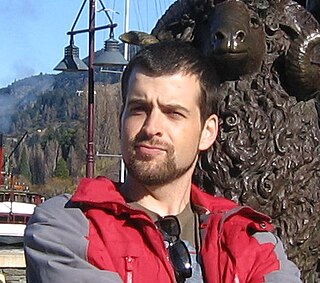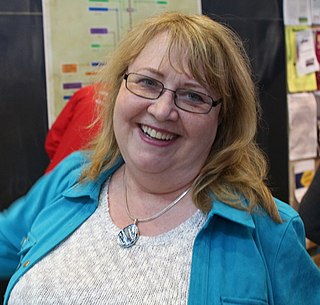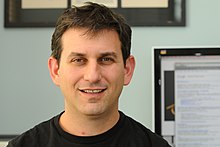
R-trees are tree data structures used for spatial access methods, i.e., for indexing multi-dimensional information such as geographical coordinates, rectangles or polygons. The R-tree was proposed by Antonin Guttman in 1984 and has found significant use in both theoretical and applied contexts. A common real-world usage for an R-tree might be to store spatial objects such as restaurant locations or the polygons that typical maps are made of: streets, buildings, outlines of lakes, coastlines, etc. and then find answers quickly to queries such as "Find all museums within 2 km of my current location", "retrieve all road segments within 2 km of my location" or "find the nearest gas station". The R-tree can also accelerate nearest neighbor search for various distance metrics, including great-circle distance.

MonetDB is an open-source column-oriented relational database management system (RDBMS) originally developed at the Centrum Wiskunde & Informatica (CWI) in the Netherlands. It is designed to provide high performance on complex queries against large databases, such as combining tables with hundreds of columns and millions of rows. MonetDB has been applied in high-performance applications for online analytical processing, data mining, geographic information system (GIS), Resource Description Framework (RDF), text retrieval and sequence alignment processing.
A visual sensor network or smart camera network or intelligent camera network is a network of spatially distributed smart camera devices capable of processing, exchanging data and fusing images of a scene from a variety of viewpoints into some form more useful than the individual images. A visual sensor network may be a type of wireless sensor network, and much of the theory and application of the latter applies to the former. The network generally consists of the cameras themselves, which have some local image processing, communication and storage capabilities, and possibly one or more central computers, where image data from multiple cameras is further processed and fused. Visual sensor networks also provide some high-level services to the user so that the large amount of data can be distilled into information of interest using specific queries.
Amit Sheth is a computer scientist at University of South Carolina in Columbia, South Carolina. He is the founding Director of the Artificial Intelligence Institute, and a Professor of Computer Science and Engineering. From 2007 to June 2019, he was the Lexis Nexis Ohio Eminent Scholar, director of the Ohio Center of Excellence in Knowledge-enabled Computing, and a Professor of Computer Science at Wright State University. Sheth's work has been cited by over 48,800 publications. He has an h-index of 106, which puts him among the top 100 computer scientists with the highest h-index. Prior to founding the Kno.e.sis Center, he served as the director of the Large Scale Distributed Information Systems Lab at the University of Georgia in Athens, Georgia.
Oscar Peter Buneman, is a British computer scientist who works in the areas of database systems and database theory.

Georg Gottlob FRS is an Austrian-Italian computer scientist who works in the areas of database theory, logic, and artificial intelligence and is Professor of Informatics at the University of Calabria. He was Professor at the University of Oxford.

Samuel R. Madden is an American computer scientist specializing in database management systems. He is currently a professor of computer science at the Massachusetts Institute of Technology.

Patricia G. Selinger is an American computer scientist and IBM Fellow, best known for her work on relational database management systems.

Michael Ralph Stonebraker is a computer scientist specializing in database systems. Through a series of academic prototypes and commercial startups, Stonebraker's research and products are central to many relational databases. He is also the founder of many database companies, including Ingres Corporation, Illustra, Paradigm4, StreamBase Systems, Tamr, Vertica and VoltDB, and served as chief technical officer of Informix. For his contributions to database research, Stonebraker received the 2014 Turing Award, often described as "the Nobel Prize for computing."

Tomasz Imieliński is a Polish-American computer scientist, most known in the areas of data mining, mobile computing, data extraction, and search engine technology. He is currently a professor of computer science at Rutgers University in New Jersey, United States.
Hari Balakrishnan is the Fujitsu Professor of Computer Science and Artificial Intelligence in the Department of Electrical Engineering and Computer Science at MIT, and the Co-founder and CTO at Cambridge Mobile Telematics.
Dataspaces are an abstraction in data management that aim to overcome some of the problems encountered in data integration system. The aim is to reduce the effort required to set up a data integration system by relying on existing matching and mapping generation techniques, and to improve the system in "pay-as-you-go" fashion as it is used. Labor-intensive aspects of data integration are postponed until they are absolutely needed.
Online aggregation is a technique for improving the interactive behavior of database systems processing expensive analytical queries. Almost all database operations are performed in batch mode, i.e. the user issues a query and waits till the database has finished processing the entire query. On the contrary, using online aggregation, the user gets estimates of an aggregate query in an online fashion as soon as the query is issued. For example, if the final answer is 1000, after k seconds, the user gets the estimates in form of a confidence interval like [990, 1020] with 95% probability. This confidence keeps on shrinking as the system gets more and more samples.

Martin L. Kersten was a computer scientist with research focus on database architectures, query optimization and their use in scientific databases. He was an architect of the MonetDB system, an open-source column store for data warehouses, online analytical processing (OLAP) and geographic information systems (GIS). He has been (co-) founder of several successful spin-offs of the Centrum Wiskunde & Informatica (CWI).
A sensor network query processor (SNQP), also called a sensorDB, is a user-friendly interface for programming and running applications which translates instructions from declarative programming language with high-level instructions to low-level instructions understood by the operating system. The basic idea of SNQP is the addition of a layer modeling the WSN as a distributed database searchable by a query language similar to SQL.

Jeffrey Michael Heer is an American computer scientist best known for his work on information visualization and interactive data analysis. He is a professor of computer science & engineering at the University of Washington, where he directs the UW Interactive Data Lab. He co-founded Trifacta with Joe Hellerstein and Sean Kandel in 2012.

Gautam Das is a computer scientist in the field of databases research. He is an ACM Fellow and IEEE Fellow.
Daniel Abadi is the Darnell-Kanal Professor of Computer Science at University of Maryland, College Park. His primary area of research is database systems, with contributions to stream databases, distributed databases, graph databases, and column-store databases. He helped create C-Store, a column-oriented database, and HadoopDB, a hybrid of relational databases and Hadoop. Both database systems were commercialized by companies.
Tim Kraska is a German computer scientist specializing in data systems and the intersection of systems and machine learning. He is currently an associate professor of computer science at the Massachusetts Institute of Technology.
In computer science, macroprogramming is a programming paradigm aimed at expressing the macroscopic, global behaviour of an entire system of agents or computing devices. In macroprogramming, the local programs for the individual components of a distributed system are compiled or interpreted from a macro-program typically expressed by a system-level perspective or in terms of the intended global goal. The aim of macroprogramming approaches is to support expressing the macroscopic interactive behaviour of a whole distributed system of computing devices or agents in a single program. It has not to be confused with macros, the mechanism often found in programming languages to express substitution rules for program pieces.










